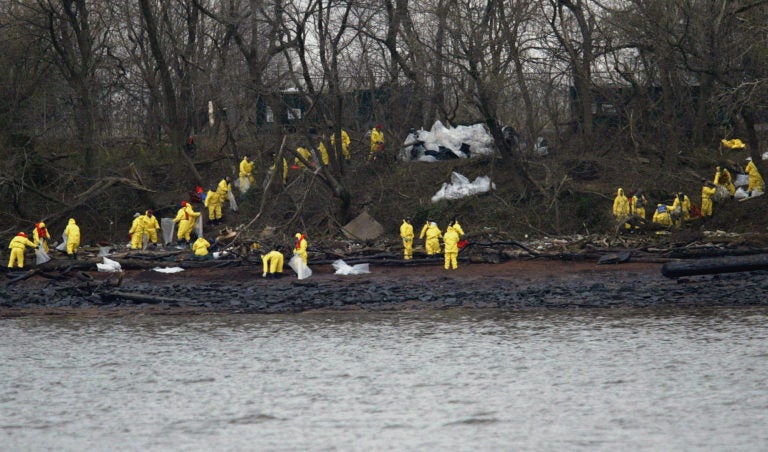Citgo ruled liable for millions in Delaware River cleanup costs from 2004 oil spill
The Supreme Court ruled the company, ex-owner of an area asphalt refinery, is liable for millions paid by the government and owner of the ruptured tanker.

Work crews clean oil off the banks of the Delaware River in National Park, N.J., Monday, Dec. 6, 2004. The Athos I spilled as much as 470,000 gallons of thick crude oil into the Delaware River, killing wildlife and spreading along 70 miles of the waterway. (Joseph Kaczmarek/AP Photo)
Citgo, the former owner of a Philadelphia-area asphalt refinery, is liable for millions of dollars in cleanup costs stemming from a Delaware River oil spill in 2004, the U.S. Supreme Court ruled this week.
The spill was caused when a tanker approaching the Citgo refinery dock in Paulsboro, New Jersey, struck a submerged anchor. The anchor tore the vessel’s hull, leaking an estimated 264,000 gallons of heavy crude oil into the Delaware River. The incident temporarily shut down a nuclear power plant, delayed shipping for days, affected hundreds of miles of shoreline, and killed more than 180 birds.
In the immediate aftermath, the tanker’s owner — Frescati Shipping Co. Ltd. — and the U.S. government paid more than $140 million toward the spill’s cleanup, Courthouse News reported. But the Oil Pollution Act of 1990, passed as an amendment to the Clean Water Act, allows recovery of cleanup funds from liable parties after the fact. So the government and Frescati sued Citgo for negligence and breach of contract when it came to ensuring safe passage for the oil tanker.
The resulting case bounced around the lower courts for more than a decade. In 2016, a federal judge in Philadelphia ordered the petroleum corporation to pay $71.5 million to the ship owner and operator and $48.6 million to cover about half of the federal cleanup, a total of about $120 million, the Philadelphia Inquirer reported. Citgo contested the ruling, which then moved the case to the Supreme Court.
The question of liability ultimately came down to a “safe-berth clause” in the charter contract that effectively spelled out the responsibilities of each party when it came to the ship and its journey and cargo — and which the Supreme Court interpreted as a guarantee of the ship’s safety during the voyage until (and including) its docking at the Gloucester County-based port. That means Citgo and its affiliated companies are responsible for the majority of cleanup costs, the court ruled Monday.
“We conclude that the language of the safe-berth clause here unambiguously establishes a warranty of safety,” Justice Sonia Sotomayor wrote in the majority decision. “Charterers remain free to contract around unqualified language that would otherwise establish a warranty of safety, by expressly limiting the extent of their obligations or liability.”
The Citgo v. Frescati ruling resolves an inconsistency in federal maritime law regarding whether such a clause establishes an express warranty of ship safety, or a less rigorous responsibility of “due diligence,” in berth selection. Previous lower-court decisions disagreed on the interpretation of this clause.
WHYY is your source for fact-based, in-depth journalism and information. As a nonprofit organization, we rely on financial support from readers like you. Please give today.






